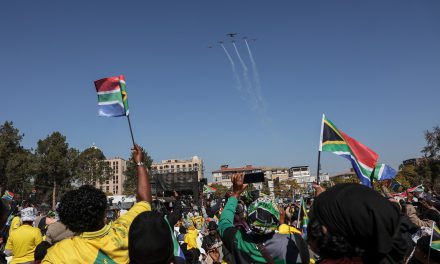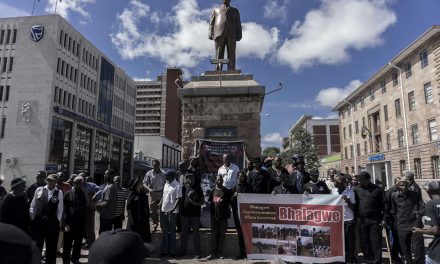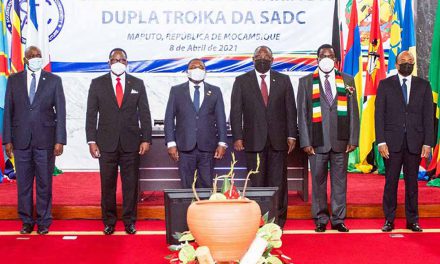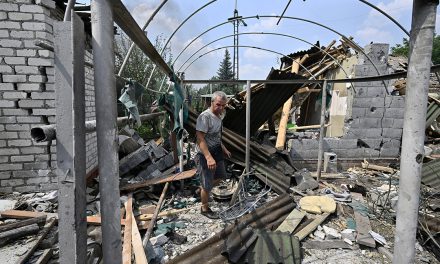On 7 July 2021, former President Jacob Zuma began serving a 15-month prison sentence. His arrest stemmed from an unprecedented judgment by the Constitutional Court, which called for his imprisonment for failing to appear before the State Capture Inquiry. The following week was characterised by widespread public violence, destructive looting, and destruction of property, as well as injuries and deaths.
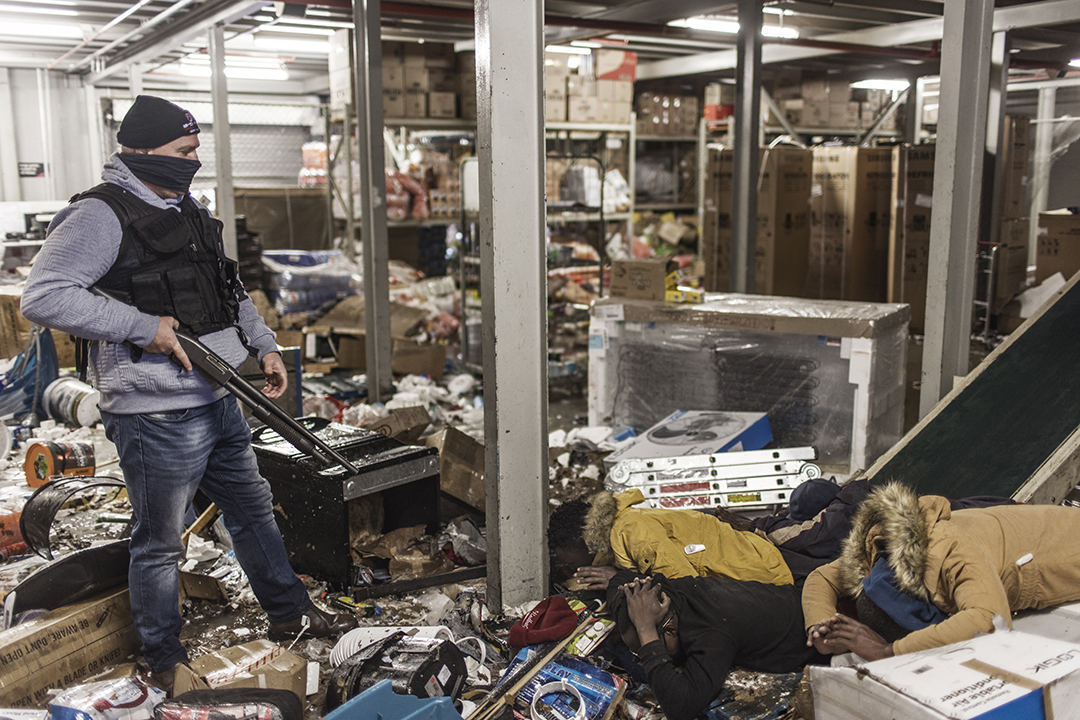
July 13, 2021: Suspected looters are pinned to the ground by an armed private security officer looking for looters, inside a flooded mall in Vosloorus. June 8, 2022 marks the one year anniversary of the outbreak of deadly rioting triggered by the jailing of ex-president Jacob Zuma for ignoring a corruption inquiry. Photo: Marco Longari/AFP
While there have been many contestations on how to aptly refer to these events that were mainly concentrated in parts of KwaZulu-Natal and Gauteng, the impact on democratic society was clear in its magnitude. Given the effects of the violence, a year later, it is essential to reflect on the socio-economic and political causes and assess the steps that have been taken to manage or prevent its reoccurrence. Learning is important for safeguarding welfare, stability and order, presently and beyond.
What was the aftermath of the ‘winter of discontent?
Public violence is not exclusive to South Africa. For one, in January 2021, similar and perhaps more dramatic scenes were witnessed in the established democracy in the United States of America, with the Capitol Riots, following the ousting of Donald Trump as President. Violence of the same scale and intensity was evident in yellow vest protests in France throughout 2021. Closer to home, in neighbouring Eswatini, around the same time, widespread protests and unrest, over the lack of commitment to political reform and clampdowns, took place in the kingdom.
Meanwhile, on 1 April 2022, President Ramaphosa, as head of state, gave evidence at the recently concluded South African Human Rights Commission’s National Investigative Hearing into the July 2021 unrest. In his testimony, President Ramaphosa estimated the economic costs to be over ZAR 50 billion, which was wiped from the economy. He further cited the loss of over two million jobs and disruption of supply chains countrywide. Other costs include the loss of livelihoods, shortage of food supplies, a humanitarian crisis, and the loss of over 350 lives. The President further told the commission that the government had taken “decisive steps” to ensure that such events did not reoccur”. Yet, there are signs that present conditions could lead to a repeat of last year’s events.
What went wrong, and what needs to be fixed?
Following the unrest, the President announced the establishment of an expert panel to inquire into and review the government’s response to the events. The panel raised several salient points on the causes in its 154-page report. These included the multiple economic challenges of youth unemployment, pervasive poverty, and the existing societal challenges of deep-seated racial tensions. The report also pointed to local government governance challenges, including poor living conditions, spatial planning, and service delivery. At a national level, corruption, state capture, and intra-party contestations fuelled the lack of political accountability. In practice, these issues resulted in a government and security cluster which lacks coordination, is unprepared, and failed to respond to the violence and looting effectively.
- A crisis in local government – the perennial failures, including backlogs in infrastructure provision, poor service delivery, and lack of maintenance, was a significant contributory factor. The dysfunction is compounded by poor political and administrative governance and general malfeasance, as readily seen through poor audit outcomes. The direct impact of these events is witnessed in the decline of local economic development, from a loss of business confidence and closure of businesses across many towns, and the growing unemployment and poverty which follows. The impact is also witnessed in the lack of preparedness for natural disasters, as seen in the recent devastation of the floods in KZN. No political party achieved an outright majority in the November 2021 local government elections in all the Metropolitan municipalities at the heart of the July unrest, namely, Ethekwini, Ekurhuleni, the City of Johannesburg, and Tshwane. The election was also characterised by low voter turnout, which also serves as a testament to these issues and citizens’ dissatisfaction. Worryingly, the failures are manifesting in daily service delivery protests, which can be the catalyst that sparks unrest.
- Lack of social cohesion – the challenge of achieving societal transformation and inclusive development has resulted in a lack of social cohesion. In the lead-up to the unrest, cleavages along ethnic and tribal lines were being stoked, as witnessed in the pronouncements in the Nkandla compound. During the unrest, a lack of social cohesion led to racial violence between many Indian and Black residents in Phoenix and surrounding areas in KZN. These divisions are readily seen through the anti-migrant sentiment which is on the rise. The growing discourse around issues such as rising unemployment and crime tends to place the blame for the challenges on illegal immigrants from the African continent. Recently, this sentiment led to violent acts like the attacks and blockades on the trucking industry and drivers, which have been commonplace along key arterial routes like the N3, amounting to economic sabotage. This was a key spark of last year’s unrest. Moreover, it has resulted in the rise of vigilante groupings like Operation Dudula, which politicise migration to advance their causes and justify their actions, and fueling xenophobic fervour which result in violent demonstrations and attacks such as the torching of Yeoville Market in Johannesburg. These events have security implications, as they compound the likelihood of instability and unrest.
- The ramifications of intra-party political contestation – internal battles within the African National Congress were a significant contributor to the unrest. The panel report added that the ANC’s division contributed to the unrest and should be addressed “as a matter of national security now.” This has played out in several ways. For one, as a precursor, the tensions and factionalism within the party in 2016, before the local government elections, resulted in widespread violence in Tshwane over the nomination of Thoko Didiza as mayor. Daily, different factions and competing groupings use genuine public grievances and citizens as tools to stoke violent protests in communities over narrow interests. In December 2022, the party is having its conference. Beyond the documented misuse and abuse of state resources and security apparatus for party battles, the likelihood of violence being used as a political tool remains present.
- Concerning the inherent challenges in the security cluster – recently, SASRIA, the state insurer which covers and pays claims related to the civil unrest, noted that had the security agencies responded effectively from the outset, and assuming there had been no additional, consequential damage, the loss from the unrest could have amounted to a figure way lower than the current estimates. Following the failure of intelligence agencies to predict and prevent the events, the State Security Agency (SSA) was restructured and moved to the presidency, and the minister of Public Service and Administration, Ayanda Dlodlo, was removed from her position. The events and the disagreements with the President over how to describe them also led to the removal of the Minister of Defence, Nosiviwe Mapisa-Nqakula, from her portfolio, although this measure can be seen as a promotion rather than a punitive action. Within the South African Police Service, there was an inability to respond to the events; one of the reasons cited was an overstretch of capacity, however, poor coordination was evident, and one of the reasons for this was the acrimonious relationship between the Minister and the Commissioner of Police commissioner, who was ultimately removed from his position. More recently, The Zondo Commission’s final report into State Capture documents the rot within the Security Cluster in general, and specifically, an inability of the state’s intelligence apparatus. Presently, events that show the challenges best include the recent laying of criminal charges against the President by the former head of head of the SSA, Arthur Frazer, who was also at the centre of Zuma’s release after being appointed as head of correctional services.
How does South Africa move forward?
The high-level panel warned that it might only be a matter of time until more unrest occurs. While a range of policy interventions have been proposed, the issues mentioned above show that they have not been addressed in a comprehensive manner and the pre-existing conditions remain. There is a clear absence of a management framework to adequately prevent threats to human life, critical infrastructures such as electrical substations and other national key points, as well as other public and private property, which remains vulnerable to targeted acts of sabotage, arson and other attacks. The panel also called for a more responsible Cabinet, better coordination and alignment, with strengthened capacity of security services, a stronger early warning capability, as well as a better management of party contestations. Moreover, the need to address the existing material conditions and ensure public confidence in state institutions is still pressing. Only if meaningful action follows will the lessons of the July unrest be genuinely learned.
This article first appeared in the Mail & Guardian.



